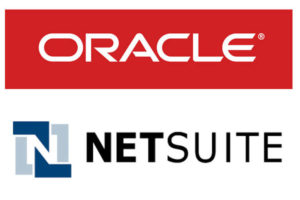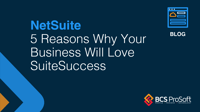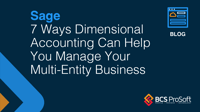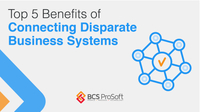There are new requirements for ERP systems coming down the pike, including new regulations that have made IT executives sit up and take notice. We’ll be seeing many of these changes this coming year.
This post originally appeared on eWeek.
 Enterprise resource planning software, otherwise known by the acronym ERP, became a huge trend late in the 1990s and early 2000s. Through no fault of its own, it since has been eclipsed in the news by sexier enterprise data management packages such as mobile device management (MDM), customer relationship management (CRM) and other acronymed systems.
Enterprise resource planning software, otherwise known by the acronym ERP, became a huge trend late in the 1990s and early 2000s. Through no fault of its own, it since has been eclipsed in the news by sexier enterprise data management packages such as mobile device management (MDM), customer relationship management (CRM) and other acronymed systems.
ERP systems have generally worked well and only have to be updated or replaced every several years. In the past, they hadn’t cried out for a lot of attention, because overall, they worked well enough and don’t need a lot of tinkering. As a result, there hasn’t been a whole of press about this part of the business in the last few years.
However, there are new requirements for ERP systems coming down the pike, including new regulations that have made IT executives sit up and take notice. We’ll be seeing many of these changes this coming year, and ERP systems will need to be updated as a result.
ERP is still a major cog in the daily work of IT systems management and all the C-level (COOs, CIOs, CFOs, etc.) and middle-management folks who rely on it to keep track of all their business assets. To be sure, this type of software is getting smarter with the infusion of analytics and big data storage and analysis capabilities being included in recent versions.
Last month, eWEEK published a series of more than 20 prediction articles for 2018 involving sectors of the IT business that we cover regularly. Here’s an additional one for the ERP business. Industry information for this article comes from Paul Farrell, VP of Product Marketing at NetSuite and Steve Cox, Group Vice-President of Oracle ERP.
AI/ML Will Become a Must in Every IT Strategy
Driven by competitive pressures and the exponential growth of organizational data, all IT strategies will need to include how the organization will take advantage of artificial intelligence (AI) and machine learning (ML).
Organizations Will Rethink Relationship Between Cloud and Security
As data security becomes more important, cloud-based ERP will become more, not less, attractive to adopters. The misbelief that security is degraded when switching to the cloud has been a significant roadblock for widespread adoption. This perception will soon shift as corporate leaders realize that as enterprise cloud platforms evolve, they will provide more nimble, updatable and modern protections than aging on-premise systems.
Insights Will Be Proactive and Intelligent
Most firms are swimming in data but only use about a third of it. Worse, only 29 percent say they are good at translating the result of data and analytics into measurable business outcomes. Profit-driving insights will become more accurate and applicable with cloud-based ERP tools. As different business units and employees upload more and more data, decision makers will have the most holistic view of their enterprises they’ve ever had. On a macro level, cloud providers will be able to view these constantly-expanding webs of transactions and operations across industries and provide rich, detailed insights to their clients.
Mobile Will Be Table Stakes
Mobile has revolutionized enterprise productivity and is now expected from customers, employees and vendors alike. However, it is estimated that even in 2017 the typical organization has roughly 40 percent of platform-dependent applications. With this in mind, companies will be updating their most-used business tools so they are accessible on any device and from anywhere.
Everything Must be Global
International business requires complex systems that can operate and translate on a global scale. Multinational organizations need the cloud to keep their operations consistent across different currencies, languages, and regulations. Compliance is a significant concern as changing regulations, like the adoption of the General Data Protection Regulation (GDPR) in the EU (coming May 25), can be costly to companies with older systems unable to adjust in time. According to McKinsey, some businesses are spending up to $50 million to update customer databases to be GDPR compliant.
We Will See the End of ‘One Size Fits All’
No two companies are the same, and neither are their ERP needs. Carefully choosing the functionalities needed for your organization is one key benefit of cloud-based ERP, but that is not where the personalization stops. The user experience (that of employees in this case) will finally match the expectations of the user. Enterprise applications such as ERP and EPM (enterprise project management) will become as easy to use as commonplace consumer applications, such as email and calendar. And forget typing or tapping; expect voice and gesture interaction to become even more important.
Data Will Have a Huge Blind Spot if Not Sourced by IoT
IoT is officially entering business maturity. According to a Verizon survey, 73 percent of executives are either researching or currently deploying IoT technology. The consistent stream of data from IoT devices is a godsend for ERP analytics, but it requires cutting-edge technology capable of integrating the data. A cloud-based ERP system is a natural counterpart to a robust IoT ecosystem that can utilize the data as it is gathered consistently and automatically acts on that data. In 2018, “dark data”–data that organizations can’t access–will no longer be acceptable, given the maturity of technologies targeted at making data insights actionable.
Industry Adoption of Cloud ERP Solutions Will Accelerate
In 2018, cloud-based ERP will take on a dominant position in the manufacturing, distribution and, increasingly, retail industries. In addition to the economic benefits, adopters in these industries recognize that the collaborative functionality of the cloud can be a game changer that empowers distributed employees and boosts satisfaction. Industry specific functionalities are also important. For example, manufacturers will have the ability to tap into specific capabilities, such as manufacturing execution or shop floor data collection, and retailers can add a whole range of omni-channel capabilities to meet consumer expectations.
Enterprises Will Understand the Need for a Solid, Cloud-Based Foundation
New technologies such as IoT, blockchain and AI have become more mainstream, and there is a widespread recognition that adopting them is a key element to future success. However, there is also increasing awareness that without a stable cloud foundation, it will be very difficult to implement these new, cutting-edge capabilities. Companies need a solution that is always on, always available, always accessible, customizable and can integrate with new technologies. The moment to take action is now. Organizations will recognize that they must move swiftly and nimbly to adopt new strategies, approaches and technologies to continue to stay competitive.
There Will be an Increased Need for ‘Plug and Play’ Applications
The era of two-year implementation and training cycles is over. Businesses need to respond quickly to rapid marketplace changes, so new applications need to be easy to adopt and use. As a result, cloud-based ERP will be increasingly attractive to several businesses, as it is easy to install and customizable for a variety of users.







